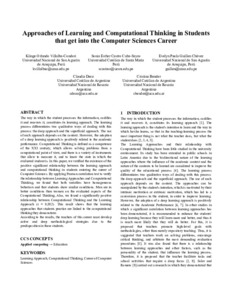Por favor, use este identificador para citar o enlazar este ítem:
https://repositorio.uca.edu.ar/handle/123456789/8436| Título: | Approaches of learning and computational thinking in students that get into the computer sciences career | Autor: | Villalba Condori, Klinge Orlando Castro Cuba-Sayco, Sonia Esther Guillen Chávez, Evelyn Paola Deco, Claudia Bender, Cristina |
Palabras clave: | PROCESO DE APRENDIZAJE; ESTUDIANTES UNIVERSITARIOS; RESOLUCION DE PROBLEMAS; COMPETENCIAS; SIGLO XXI; EDUCACION | Fecha de publicación: | 2018 | Editorial: | ACM | Cita: | Villalba-Condori KO, Castro Cuba-Sayco SE, Guillen Chávez EP, Deco C, Bender C. Approaches of learning and computational thinking in students that get into the computer sciences career [en línea]. TEEM'18 Proceedings of the Sixth International Conference on Technological Ecosystems for Enhancing Multiculturality. 2018. doi: 10.1145/3284179.3284185 Disponible en: https://repositorio.uca.edu.ar/handle/123456789/8436 | Resumen: | Abstract: The way in which the student processes the information, codifies it and recovers it, constitutes its learning approach. The learning process differentiates two qualitative ways of dealing with this process: the deep approach and the superficial approach. The use of each approach depends on the context. However, the adoption of a deep learning approach is positively related to the academic performance. Computational Thinking is defined as a competence of the XXI century, which allows solving problems from a computational point of view, and there is a variety of instruments that allow to measure it, and to know the state in which the evaluated student is. In this paper, we verified the existence of the positive significant relationship between the learning approach and computational thinking in students entering the career of Computer Sciences. By applying Pearson correlation test to verify the relationship between Learning Approaches and Computational Thinking, we found that both variables have homogeneous behaviors and that students show similar conditions. Men are in better conditions than women on the evaluated aspects of the Computational Thinking, Also, we found a significantly positive relationship between Computational Thinking and the Learning Approach (r = 0,882). This result shows that the learning approaches that students practice are linked to the computational thinking they demonstrate. According to the results, the teachers of this career must develop active and deep methodological strategies due to the predisposition in these students. | URI: | https://repositorio.uca.edu.ar/handle/123456789/8436 | ISBN: | 978-1-4503-6518-5 | DOI: | 10.1145/3284179.3284185 | Derechos: | Acceso Abierto | Fuente: | TEEM'18 Proceedings of the Sixth International Conference on Technological Ecosystems for Enhancing Multiculturality |
| Aparece en las colecciones: | Artículos Artículos |
Ficheros en este ítem:
| Fichero | Descripción | Tamaño | Formato | |
|---|---|---|---|---|
| approaches-learning-computational-thinking.pdf | 302,62 kB | Adobe PDF |  Visualizar/Abrir |
Visualizaciones de página(s)
191
comprobado en 30-abr-2024
Descarga(s)
389
comprobado en 30-abr-2024
Google ScholarTM
Ver en Google Scholar
Altmetric
Altmetric
Este ítem está sujeto a una Licencia Creative Commons

